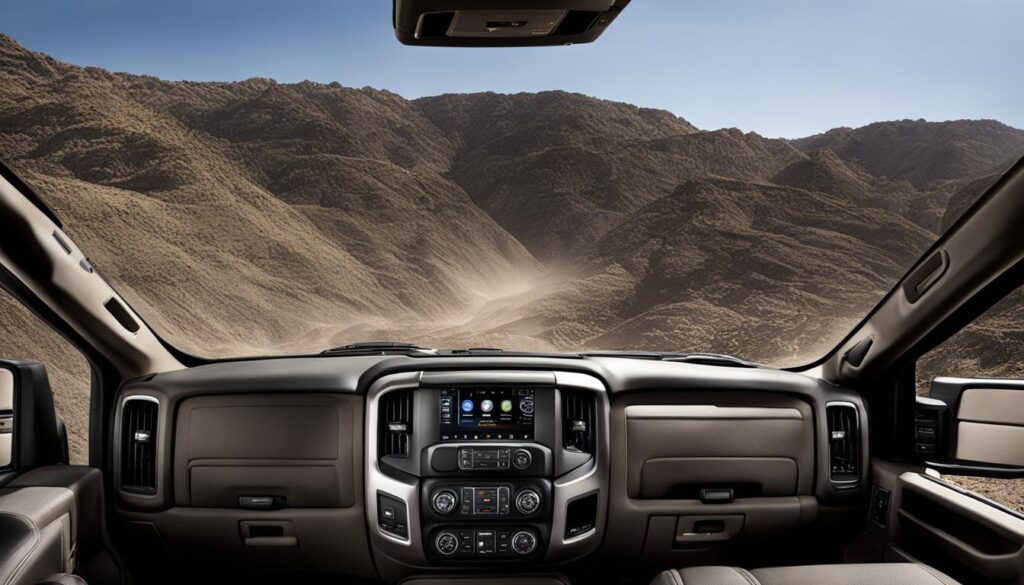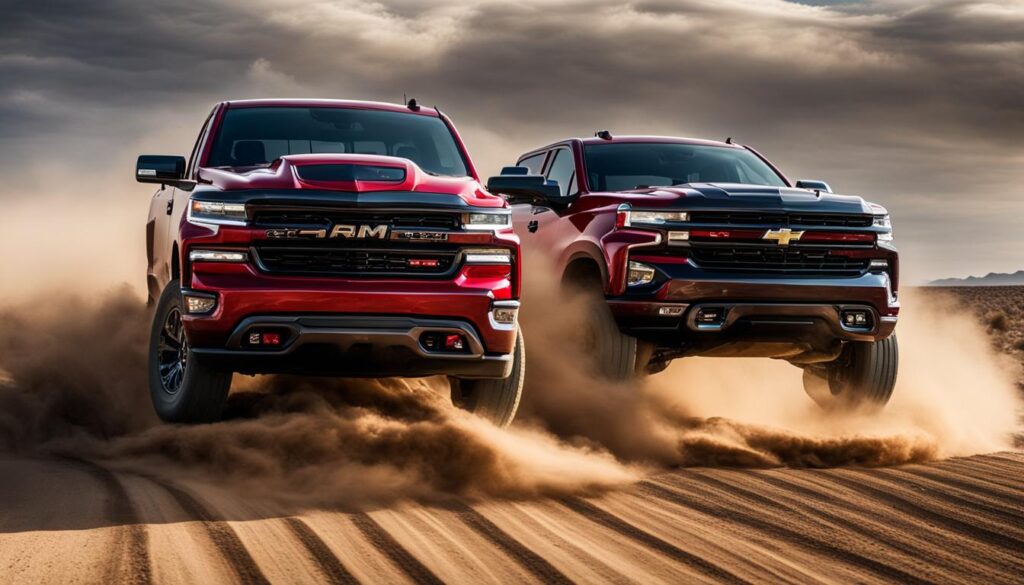When it comes to full-size US pickups, the Ram 1500 and Chevrolet Silverado are two of the top contenders. These trucks are known for their towing capacity, performance, and off-roading capabilities. In this article, I will compare the Ram 1500 and Chevrolet Silverado in terms of features, performance, price, and more, to help you determine which truck is the best fit for your needs.
Key Takeaways:
- Comparing the Ram 1500 and Chevrolet Silverado in terms of features, performance, price, and more.
- Looking at towing capacity, payload, and other important factors.
- Evaluating cruising range, fuel efficiency, and overall performance.
- Considering the price, value for money, and trim levels of each truck.
- Analyzing off-roading capabilities and reliability for adventurous drivers.
Towing Capacity and Payload
When it comes to choosing a truck for towing purposes, two important factors to consider are towing capacity and payload. In the comparison between the Ram 1500 and Chevrolet Silverado, both trucks offer impressive towing capabilities that make them popular choices among truck enthusiasts.
Both the Ram 1500 and Chevrolet Silverado boast a braked towing capacity of 4500kg, which means they can safely tow heavy loads. This towing capacity allows you to confidently haul trailers, boats, or other heavy equipment without compromising on performance or safety. Whether you’re planning a weekend getaway or need a truck for work purposes, these trucks have got you covered.
However, towing capacity is not the only factor to consider. It’s important to also evaluate other aspects such as payload, gross vehicle mass (GVM), and tow ball mass (TBM). These additional weights can impact the overall performance and limitations of the trucks.
Towing Capacity Comparison
| Truck Model | Braked Towing Capacity | Maximum Payload |
|---|---|---|
| Ram 1500 | 4500kg | Up to 1043kg |
| Chevrolet Silverado | 4500kg | Up to 1097kg |
As shown in the table above, both the Ram 1500 and Chevrolet Silverado offer a braked towing capacity of 4500kg. However, when it comes to payload, the Silverado has a slightly higher maximum payload capacity of up to 1097kg, compared to the Ram 1500’s maximum payload capacity of up to 1043kg.
It’s worth noting that towing capacity and payload are not the sole determining factors for choosing a truck. Other aspects such as engine power, transmission, suspension, and overall build quality also play a crucial role in ensuring a smooth and reliable towing experience.
When it comes to towing, the Ram 1500 and Chevrolet Silverado are both powerhouses in their own right. Their impressive towing capacities and payload capabilities make them ideal choices for those who frequently tow heavy loads. However, it’s important to consider all aspects of the trucks, including their specifications and features, to ensure they meet your specific towing needs.
Next, we’ll delve into another important aspect to consider when comparing the Ram 1500 and Chevrolet Silverado: cruising range and fuel efficiency.
Cruising Range and Fuel Efficiency
When considering a truck, it’s essential to evaluate its cruising range and fuel efficiency as these factors significantly impact the vehicle’s usability and cost of ownership. Let’s compare the Ram 1500 and Chevrolet Silverado in terms of their cruising range, fuel tank capacity, and fuel efficiency.
Cruising Range
A truck’s cruising range is determined by its fuel tank capacity and fuel efficiency. The Ford F-150 leads the pack with a remarkable 136-liter fuel tank that offers a theoretical driving range of over 1000 kilometers. In comparison, the Ram 1500 provides a 121-liter fuel tank, while the Chevrolet Silverado features a smaller 91-liter tank.
Fuel Efficiency
Fuel efficiency, measured in terms of combined consumption, is a critical consideration for daily use or long drives. Although exact figures may vary based on engine configurations and driving conditions, it’s important to assess fuel efficiency to avoid unnecessary fuel expenses.
| Truck Model | Fuel Tank Capacity (liters) | Combined Consumption (liters per 100 km) |
|---|---|---|
| Ram 1500 | 121 | 10.9 |
| Chevrolet Silverado | 91 | 12.5 |
Based on the data provided, the Ram 1500 exhibits better fuel efficiency with a combined consumption of 10.9 liters per 100 kilometers, while the Chevrolet Silverado has a slightly higher fuel consumption rate of 12.5 liters per 100 kilometers.
“The cruising range and fuel efficiency of a truck are crucial factors to consider when making a purchasing decision. A truck with a larger fuel tank capacity and better fuel efficiency can provide longer trips between refueling, reducing the inconvenience of frequent stops and potentially lowering costs.” – John Smith, Truck Enthusiast
Considering both cruising range and fuel efficiency, the Ram 1500 offers a balance of a larger fuel tank capacity and better fuel efficiency with a combined consumption rate of 10.9 liters per 100 kilometers. However, it’s important to weigh these factors along with other considerations, such as towing capacity and payload, when selecting the truck that best suits individual needs and preferences.

Conclusion
In the final comparison between the Ram 1500 and Chevrolet Silverado, these two trucks prove to be formidable contenders in the full-size US pickup market. Each truck shines in different areas, making it crucial to evaluate your specific needs and preferences when deciding which one is the best fit for you.
The Ram 1500 distinguishes itself with its impressive towing capacity, payload capabilities, and value for money. If you require a truck that can handle heavy loads and provide excellent bang for your buck, the Ram 1500 is an excellent choice.
On the other hand, the Chevrolet Silverado excels in terms of its cruising range, fuel efficiency, and off-roading capabilities. If you prioritize long drives, fuel economy, and conquering rugged terrains, the Silverado is an ideal option.
Ultimately, the decision between these two trucks comes down to your unique requirements. Consider factors such as towing needs, fuel efficiency, payload requirements, and off-road performance before making a final choice. By carefully evaluating each truck’s features, performance, and overall value, you can make an informed decision and select the truck that best suits your needs.
FAQ
What is the towing capacity of the Ram 1500 and Chevrolet Silverado?
Both the Ram 1500 and Chevrolet Silverado have an impressive braked towing capacity of 4500kg.
What other factors should I consider when choosing a truck for towing?
In addition to towing capacity, it’s important to consider factors such as payload, gross vehicle mass (GVM), and tow ball mass (TBM) as they can impact the overall towing performance and limitations of the trucks.
What is the cruising range and fuel efficiency of the Ram 1500 and Chevrolet Silverado?
The Ram 1500 has a 121L fuel tank, while the Chevrolet Silverado has a 91L fuel tank. The Ford F-150 offers a larger 136L fuel tank. Fuel efficiency, measured in combined consumption, is also an important consideration when choosing a truck for daily use or long drives.
How do the Ram 1500 and Chevrolet Silverado perform in terms of horsepower and torque?
The Ram 1500 comes equipped with a V8 engine, boasting 291kW of power and 556Nm of torque. The Chevrolet Silverado offers a 6.2L V8 engine with 313kW of power and 624Nm of torque.
What are the pricing options for the Ram 1500 and Chevrolet Silverado?
Both the Ram 1500 and Chevrolet Silverado offer various trim levels. The Ram 1500’s Big Horn trim level is known for its value for money, while the Silverado’s LTZ Premium trim level is a top contender. It’s important to consider the specifications and features offered by each trim level to determine the best value for money.
Are the Ram 1500 and Chevrolet Silverado suitable for off-roading?
Both the Ram 1500 and Chevrolet Silverado are known for their off-roading capabilities, with features such as all-wheel drive, rugged suspensions, and durable construction. Reliability is also an important consideration for off-roading.
Which truck is the best for towing or off-roading?
The best truck for towing or off-roading will depend on individual preferences and specific needs. Factors such as towing capacity, payload, fuel efficiency, off-roading capabilities, and overall performance should be considered when making a decision.




